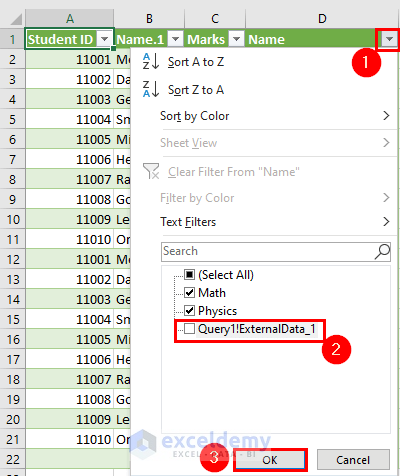5 Ways to Merge Excel Sheets with Different Columns

Merging Excel sheets, especially those with different columns, can be a daunting task. Whether you're consolidating financial reports from various departments, compiling sales data, or gathering research information, the challenge often lies in ensuring that data from disparate sources are accurately combined without losing crucial information. Here are five effective ways to merge Excel sheets with different columns, tailored for users ranging from beginners to advanced Excel enthusiasts:
1. Using Excel’s VLOOKUP and INDEX MATCH

While VLOOKUP and INDEX MATCH functions are typically used for pulling data across different sheets based on a common identifier, they can also be utilized to merge columns:
- VLOOKUP: This function looks for a value in the first column of a table and returns a value in the same row from another column. However, it has limitations like only being able to look from left to right.
- INDEX MATCH: A more versatile alternative to VLOOKUP, this combination lets you look up values in any column of the lookup table and return the corresponding value from any other column.
🚀 Note: These methods work best when you have at least one column in common across the sheets for matching.
2. Power Query

Power Query, an Excel add-in, provides a powerful tool for data transformation:
- Import all sheets into Power Query.
- Use the ‘Merge Queries’ feature to join data based on common fields.
- After merging, you can expand the column to show all the additional columns from the other sheets.
- Finally, load the transformed data back into Excel.

3. Excel Tables and Consolidation

This method involves using Excel tables:
- Convert each sheet into an Excel Table.
- Use the Data Consolidation feature to combine the tables based on position or category.
- Ensure the category columns are in the same order and have similar labels for an accurate merge.
4. Manual Copy-Paste and Macro Automation

For simple merges or one-off operations:
- Manually copy and paste columns from one sheet to another, adjusting as necessary for different columns.
- For repeated tasks, consider creating a VBA macro:
- Use
Range.Copyto copy data from different sheets. - Implement logic to insert missing columns or align data.
- Automate naming conventions, sorting, or formatting after merging.
- Use
🖥️ Note: Macros can significantly reduce repetitive work but require a basic understanding of VBA.
5. Using External Tools and Software

When Excel’s built-in tools aren’t enough:
- Tools like Microsoft Power BI or SQL databases can offer robust solutions for merging disparate datasets.
- Third-party software like Ablebits Data Merger or Spreadsheet Compare can provide additional merging functionalities.
- These tools often allow for more complex data manipulation and can handle larger datasets more efficiently than Excel.
To wrap up, merging Excel sheets with different columns doesn't have to be a headache. By selecting the right tool for the job—whether it's Excel's own functions, Power Query, macros, or external software—you can streamline the process to fit your specific needs. Each method has its strengths, and choosing the appropriate one depends on factors like the complexity of your data, your familiarity with Excel, and the frequency of your merging tasks. Understanding these techniques not only saves time but also enhances your ability to analyze and manage data effectively.
Can I merge sheets with completely different column names?

+
Yes, but you’ll need to manually align the data or use Power Query to rename or map the columns during the merge process.
What if my sheets have duplicate entries?

+
You can use functions like COUNTIF or SUMIFS to check for duplicates and handle them during the merge. Excel allows you to aggregate data or keep only unique values.
Is there a way to automate this process?

+
Yes, automation can be achieved through VBA macros for repeated tasks. Additionally, using external tools like Power BI or specialized software can automate merging based on predefined rules.



